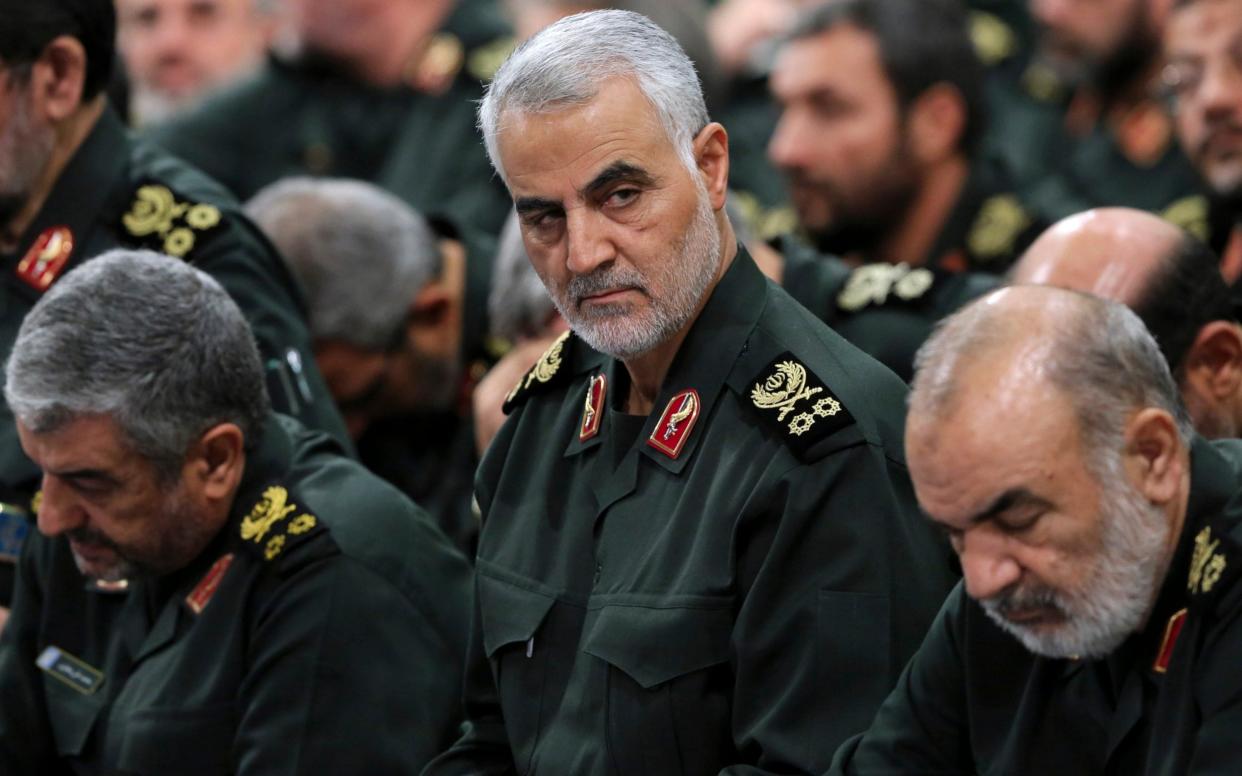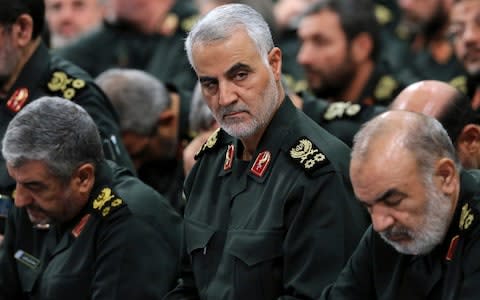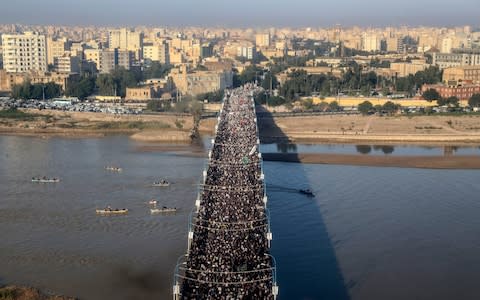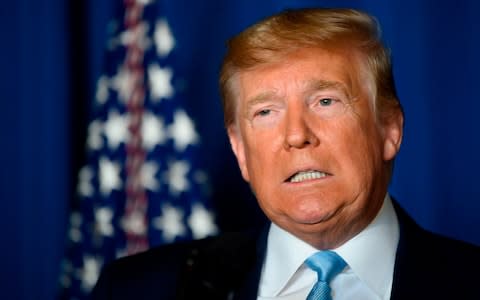Huge crowds mourn Qassim Soleimani as Iraq votes to expel US forces over assassination

Hundreds of thousands of Iranians turned out to pay their respects to General Qassim Soleimani on Sunday as Iraq's parliament voted to expel US forces from the country over his assassination in Baghdad.
The momentous vote came as Iran said it would ditch all limitations on its uranium enrichment program under the 2015 nuclear deal in response to the killing and the US-led coalition fighting Islamic State in Iraq halted operations because of fears of revenge attacks by Iranian-allied groups.
At least three rockets landed near the US embassy in Baghdad late on Sunday night, prompting Donald Trump to threaten a rapid and possible "disproportionate" response if Iran struck a US target. No casualties were immediately reported.
Earlier Adil Abdul-Mahd, Iraq’s acting prime minister, told an extraordinary session of parliament that the killing of Gen Soleimani was an "unacceptable" violation of sovereignty and asked for MPs backing to end the US-led coalition's stay in the country. The resolution passed despite a boycott by most Kurdish and Sunni MPs.

The coalition, which includes 500 British troops based in Baghdad, is in Iraq on the basis of a letter of request from the Iraqi government in 2014 to help fight Islamic State.
It was not immediately clear how quickly the troops would be asked to leave. Sunday’s vote will be seen as an ironic posthumous victory for Gen Soleimani, who had directed a proxy war against Western forces in the Middle East for years.
The influential leader of the Quds Force of the Islamic Revolutionary Guard Corps was killed on Friday in a US airstrike as his convoy left Baghdad airport.
American officials say they killed the general, who was in charge of Iran’s main expeditionary covert warfare unit and is believed to have coordinated terrorist attacks across the region, to prevent attacks he was allegedly planning against US personnel.
Iran has described the attack as the illegal murder of a national hero and has vowed to retaliate, raising fears of a regional war with the United States and its allies.
An honour guard paraded as Soleimani’s remains were flown to the southwestern Iranian city of Ahvaz, a key battlefield in the Iran-Iraq war in which he first rose to prominence, early on Sunday morning.
The flight also carried the bodies of other Iranian Revolutionary Guards and an Iraqi militia commander who were killed with him.
State television showed vast crowds of people, many dressed in black and beating their chests, thronging the caskets as they were driven slowly through the streets of the city. Soleimani’s body was flown to Mashhad, a shrine city in northeast Iran, for another public procession later on Sunday.
It will be taken to Tehran and the holy city of Qom on Monday before being finally buried in Soleimani’s hometown of Kerman on Tuesday.
The scale of the crowds, which clogged streets for miles, were said by witnesses to dwarf anything seen in Iran since the funeral of Ayatollah Khomeini, the founder of the Islamic Republic, in 1989.
Although Iran’s regime is known to order people onto the streets for pro-government demonstrations, they seldom muster more than a few thousand.

Military tensions continued to rise across the region over the weekend as Iranian officials and allied groups vowed to take revenge.
Mohsen Rezaei, a former commander of the IRGC, on Sunday said Iran’s retaliation would also include the Israeli city of Haifa and Israeli military installations.
Sayyed Hasan Nasrallah, the secretary general of the Iran-allied Lebanese militant group Hibollah, told a memorial service for Soleimani in Beirut that US military assets were “fair targets” for retaliation.
A rocket fell on Saturday evening inside the heavily fortified Green Zone, where the US Embassy is located, and two were fired at the Balad air base north of the capital, where US troops are stationed.

Iraq’s military said that no-one was killed. Mr Trump said on Saturday evening that the United States would hit back if Americans or US assets were targeted by Iran.
But he was immediately accused of planning to commit war crimes when he said on Twitter that he had drawn up a list of 52 Iranian sites “at a very high level & important to Iran & the Iranian culture, and those targets, and Iran itself, WILL BE HIT VERY FAST AND VERY HARD.”
Mohammad Javad Zarif, the Iranian Foreign Minister, responded by saying Soleoimani’s killing was a “grave breach” of international law and that “targeting cultural sites is a WAR CRIME."
Iran is home to 24 UNESCO World Heritage sites. The 1954 Hague Convention for the Protection of Cultural Property in the Event of Armed Conflict, which the US has ratified, forbids parties to conflict from attacking cultural property. Such sites could be targeted if they are being used for military purposes.
The US Department of Defence’s law of war manual states cultural property “should be safeguarded and respected.” Mike Pompeo, the US Secretary of State, said on Sunday that the US would only strike “lawful” targets.
He also defended the decision to kill Soleimani, hitting back at senior members of Congress who said intelligence they were shown did not make a convincing case that he was planning imminent attacks.
"The intelligence assessment made clear that [taking] no action - allowing Soleimani to continue his plotting and his planning, his terror campaign - created more risk than taking the action that we took last week," he told ABC's "This Week."
The European Union’s foreign policy chief on Sunday invited Mr Zarif to Brussels for talks designed to defuse the crisis.
Josep Borrell told Mr Zarif during a phone call that diplomacy was the only way out of the crisis and reiterated support for the 2015 nuclear deal, his office said in a statement.
The move reflects existing rifts between the United States and its European allies, including Britain, over Mr Trump’s hard line Iran policy, including his decision last year to withdraw the US from the nuclear agreement.

